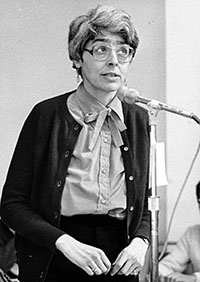Elizabeth L. Kennedy

University Archives collection: 34/5/1012
Elizabeth Kennedy began her education at Smith College, earning a BA in philosophy in 1960. After working on archaeological sites at Seattle, Albuquerque, and Jerusalem, Kennedy received her MA in anthropology from the University of New Mexico. Extensive research and fieldwork of the Waunan people in Colombia led to her 1972 PhD in social anthropology from Cambridge University. While at Cambridge, Kennedy produced three documentary films on indigenous peoples of South America allowing her to later consult with both the Canadian Broadcasting Corporation (CBC) and ITV in Great Britain.
Her professional work reflects her varied interests and accomplishments. Throughout the late 1970s and early 1980s, Kennedy collaborated with Ellen DuBois, Gail Paradise Kelly, Carolyn Korsmeyer, and Lillian Robinson on Feminist Scholarship: Kindling in the Groves of Academe (University of Illinois Press, 1985).
In the early 1990s, Kennedy's interest in oral history and activism led to the authorship of Boots of Leather, Slippers of Gold: The History of a Lesbian Community (Routledge, 1993), co-written with Madeline Davis. This book has received many honors, including the 1994 Jesse Barnard Award, 1994 Ruth Benedict Award, and a 1993 Lambda Literary Award. Long regarded as a Women's Rights, and Gay and Lesbian rights activist, Kennedy has participated in many local organizations, including the Buffalo Women's Liberation Union (BWLU) and International Women's Day coalitions. Furthermore, she established Elder Action in Gay and Lesbian Environments (EAGLES) with Madeline Davis.
Also an active at the University at Buffalo, Liz Kennedy began her career as a Deganaweda Fellow in American Studies (AMS) in 1969. By 1971, she was a faculty member and co-founder of Women's Studies College (WSC). Serving on numerous university-wide committees, Kennedy was instrumental in the development of the American Pluralism undergraduate course, which "focuses on the changing nature of American society, examining the rich diversity of cultural experiences in America and issues associated with diversity" (1992-1994 Undergraduate Catalog, p 19). Other committees that Kennedy has contributed to include the President's Commission on the Recruitment and Promotion of Women, and the Caucus on Women's Rights at SUNY.
In 1971, Kennedy participated in the founding of the University's Women's Studies College, one of the first women's studies programs in the country. WSC defined itself as follows: "This college is not a place to make women a subject to be studied but a place to break down prejudice built by our socialization about what women are and what they are capable of doing" (Summer, 1971, document on WSC, folder 19.7). Honored for her teaching skills, Kennedy developed many of the courses offered by WSC, including Women in Contemporary Society, New Research on Women, Cross-Cultural Study of Women, and the Family as an Institution. Additionally, Kennedy was active in resolving many of the difficulties Women's Studies College has faced since its inception, including budget cuts, women-only classes, and issues over its charter and degree programs. In January 1998, Kennedy left University at Buffalo to head the Women's Studies program at the University of Arizona at Tucson.
Affiliation(s): Women's Studies, American Studies
Record Group(s): 22
Biographical File Contains:
- Photographs